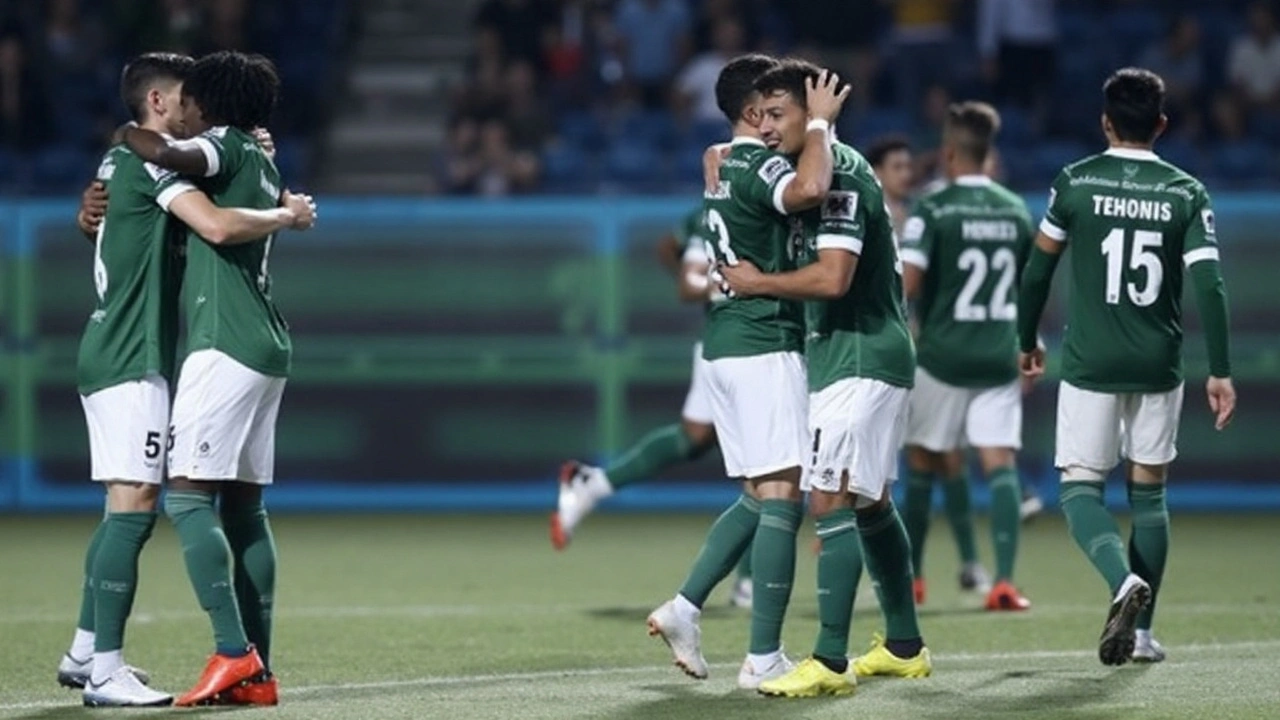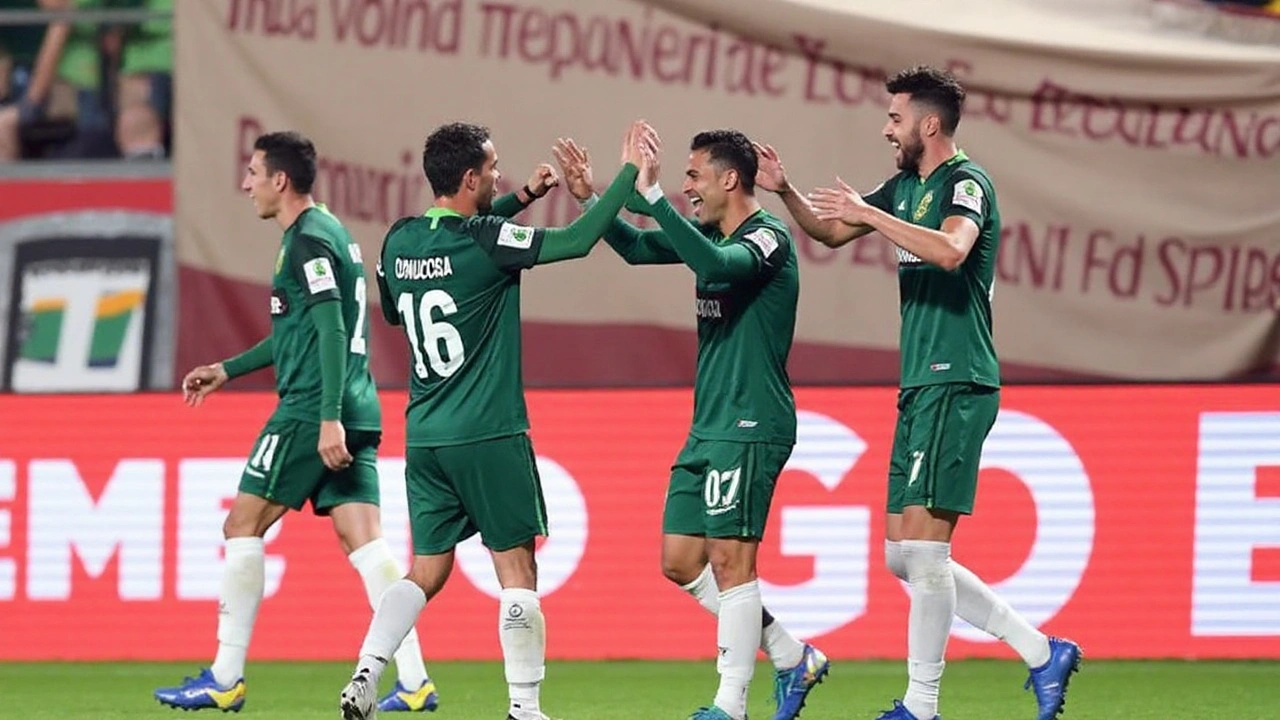22 Aug 2025
- 14 Comments
A controlled night, a bigger statement
A 0-0 that felt like a lap of honor. Palmeiras played within themselves at Allianz Parque on August 22, 2025, ticking off the final 90 minutes of a Round of 16 job already done in Peru. The Brazilian champions moved into the Copa Libertadores quarter-finals with a 4-0 aggregate win over Universitario, the second leg a measured, low-risk performance that underlined their comfort in knockout football.
The first leg in Lima did the heavy lifting. Back home, Abel Ferreira’s side managed the game with calm authority, keeping the tempo where they wanted it and denying Universitario any real momentum. The visitors showed pride and bite, but the gulf from that four-goal cushion was too wide to bridge in one of South America’s trickiest venues.
Weverton, named Player of the Match, didn’t spend the night under siege, but when called on he did the basics with total clarity—clean handling, sharp positioning, and that commanding presence that steadies a back line. In front of him, Allan was among the standouts. He read danger early, recycled possession reliably, and allowed Palmeiras to dictate the terms without chasing the game.
Palmeiras created enough half-chances to win on the night, but they didn’t need to force it. The combinations around the box were neat, the set pieces were dangerous, and the pressing traps were set to stop quick counters. If anything, the performance was more about control than spectacle—a professional closer’s outing after a ruthless first chapter in Peru.
Universitario deserved credit for showing up to compete rather than to survive. They pressed in spurts, tried to attack space wide, and never shrank from the occasion. Even down four on aggregate, they kept the scoreline respectable, denying Palmeiras joy in transition and making their duels count. It won’t numb the disappointment, but they left the pitch with their identity intact.
There were tactical tweaks throughout. Ferreira used his bench to manage energy and protect rhythm—F. Torres replaced V. Roque at the 81st minute, one of several changes that kept the shape tight and the legs fresh. Palmeiras didn’t take risks with the result on ice, and that pragmatism is a recurring theme of their knockout runs under Ferreira.
- Aggregate authority: A four-goal first-leg cushion allowed Palmeiras to play a low-variance game in São Paulo, pushing when it was on and otherwise denying transition moments.
- Goalkeeper calm: Weverton’s clean sheet owed as much to his positioning and organization as to saves—he reduced the match to routine interventions.
- Midfield balance: Allan’s screening and passing angles helped Palmeiras control the middle third, turn away pressure, and keep the ball in safe zones.
- Game management: Late substitutions, including the 81st-minute change of F. Torres for V. Roque, reinforced the structure and kept risk in check.
The bigger picture suits Palmeiras. They maintain a perfect recent record against Universitario and extend a pattern: handle the away leg with authority, bring the tie home, and drain drama from the second act. It’s not just about talent; it’s a comfort with the demands of knockouts—the patience to wait for moments, the willingness to win ugly when shine isn’t needed.
History is part of the confidence. Palmeiras’ modern era in this competition—titles in 2020 and 2021 and repeated deep runs since—has built the muscle memory that showed on Thursday night. The crowd felt it too. There was no panic when shots didn’t fall, no urge to rush the final ball. The team managed minutes, managed emotions, and preserved legs for a heavier month ahead.

Quarter-final outlook and what needs sharpening
Next up is the winner of River Plate vs. Libertad, a tie still to be decided. Either opponent will raise the stakes. If it’s River, Palmeiras face a side that loves the ball, plays with layered pressing, and punishes set-piece lapses. If it’s Libertad, the threat flips: compact blocks, quick breaks, and a knack for making you impatient. In both cases, the fine margins get finer.
What carries over? Defensive structure, first. Palmeiras have been at their best when the back line and holding midfield operate as one unit, squeezing passing lanes and turning second balls into platforms for controlled attacks. Second, the tempo control that kept Universitario at arm’s length is a must against teams that can tilt the field with one strong 15-minute spell.
What needs sharpening? Finishing. The second leg produced looks that didn’t become goals, and quarter-finals rarely offer you many. The set-piece delivery was solid, but the final contacts weren’t as clean as they could be. In the knockout rounds, one corner can swing a tie; Palmeiras will want those details polished before the next whistle.
The calendar will also test depth. Balancing domestic fixtures with continental travel can turn even stable squads ragged. Ferreira has managed this cycle well before—careful rotation without gutting the spine—but the margin for error shrinks in late August and September. Keeping the core healthy, especially in midfield and at fullback, will matter as much as any tactical tweak.
For Universitario, the exit comes with a dose of credibility. Playing at Allianz Parque with grit and composure won’t soften a 4-0 aggregate scoreline, but it does mark progress in handling high-pressure nights. The job now is carrying that standard back to their league push, turning the lessons—compact shape, smart fouling, quick regains—into points.
For Palmeiras, the night delivered exactly what they wanted: safe passage, a clean sheet, no unnecessary drama. The scoreboard said 0-0, but the message was louder. The competition’s sharp end is coming, and they look ready to live there again.


Andrew Wilchak
August 22, 2025Palmeiras just cruised, no drama needed.
Roland Baber
August 22, 2025Seeing the way they managed the second leg feels like watching a masterclass in game management. The calmness they showed under pressure is exactly what every coach should aspire to teach. It also proves that a solid first‑leg advantage lets you dictate the tempo without forcing anything. The squad’s discipline off the ball kept the visitors from getting any rhythm. All in all, it’s a blueprint for knockout success.
Phil Wilson
August 22, 2025From a tactical standpoint, Ferreira’s decision to lock the shape and use the bench wisely was spot‑on. By pulling Torres on at 81 minutes he reinforced the back line without upsetting the balance. The midfield pivot, especially Allan’s positioning, acted like a metronome, shunting passes and breaking lines. Their half‑spaces were well‑covered, limiting Universitario’s high‑press attempts. The set‑piece routines were rehearsed, but the lack of a finishing edge shows where they can sharpen up.
Roy Shackelford
August 22, 2025It’s no coincidence that the Brazilian giants keep sweeping aside the rest. Their infrastructure, money, and fan power give them an edge that’s practically built into the system. Some might call it dominance, I call it the natural order of South American football. Anything else is just wishful thinking.
Karthik Nadig
August 22, 2025What a night! Palmeiras showed why they’re the kings of the continent 🏆🔥
Charlotte Hewitt
August 23, 2025Ever wonder why the referees hardly ever make big calls against the Brazilians? That’s the hidden hand pulling strings behind the curtain. They want the Libertadores to stay Brazilian‑centric.
Jane Vasquez
August 23, 2025Wow, a 0‑0 draw and they call it a “statement”. Must have taken ages to figure out how to not score. 🙄
Hartwell Moshier
August 23, 2025It was smart, they kept the clean sheet.
Jay Bould
August 23, 2025Brazilian fans bring a vibe that can lift any team. The chants at Allianz Parque are like a wave that carries the players forward. It’s a cultural showcase as much as a football match.
Mike Malone
August 23, 2025The quarter‑final hurdle that awaits Palmeiras is a true test of both their tactical acumen and mental fortitude. While the River Plate side offers a fluid, possession‑based attack that can unsettle even the most disciplined back lines, Libertad brings a compact, counter‑punching approach that thrives on quick transitions. In either scenario, the Brazilian outfit cannot rely solely on the cushion built in the first leg; the margins in knockout football are razor‑thin. Their defensive unit, anchored by Weverton’s calming presence, must continue to operate as a cohesive shield, denying space in the final third. Moreover, the midfield trio, with Allan orchestrating the tempo, needs to maintain possession discipline while also probing for that one incisive pass that breaks lines. One area that stood out in the recent match was the lack of clinical finishing, a flaw that could become decisive against higher‑caliber opposition. The corners were delivered with reasonable accuracy, yet the strikers’ connections were either off‑target or lacked the necessary power to trouble the keeper. Training sessions should therefore emphasize the third‑time‑the‑ball effect, ensuring that players understand the importance of following up set‑piece deliveries. Additionally, squad rotation will be crucial as the congested fixture list threatens to fatigue key personnel. Ferreira’s experience in managing player workloads will be tested, especially with the domestic league still demanding attention. The full‑backs, who have provided width throughout the campaign, must be protected from overuse to preserve their pace for the decisive moments. Strategically, maintaining a compact defensive shape while allowing the wingers the freedom to surge forward could create the balance needed for a controlled yet threatening approach. Psychological preparation cannot be overlooked; the team must resist the temptation to become complacent after a comfortable aggregate win. A focused mindset, reinforced by the coaching staff’s clear communication, will help the squad stay sharp under pressure. If Palmeiras can blend their defensive solidity with a renewed attacking edge, the quarter‑finals could very well become another chapter in their storied Libertadores legacy.
Pierce Smith
August 23, 2025Both sides have earned respect for their approach, and the next clash should highlight the best of South American talent. It’ll be fascinating to see how tactics evolve under such pressure. Let’s enjoy the football.
Abhishek Singh
August 23, 2025Another “must‑sharpen” line, same old talk.
hg gay
August 23, 2025It’s refreshing to see how Universitario didn’t crumble even when the odds were stacked against them. Their willingness to press in bursts and keep the ball moving showed a collective belief that goes beyond just a single match. For many fans, that kind of grit resonates more than a simple win‑loss column. The Brazilian side, while dominant, could learn a thing or two about maintaining intensity throughout the 90 minutes. The crowd’s energy at Allianz Parque played a huge role, creating an atmosphere that lifted the home players. Yet the visitors’ disciplined defending reminded us that tactical awareness can level the playing field. As we look forward to the quarter‑finals, I hope both teams keep that spirit alive and continue to give us moments worth cheering for. Football, after all, is as much about heart as it is about skill, and this tie proved that beautifully.
Owen Covach
August 23, 2025All signs point to an exciting next round; can’t wait to see who rises to the occasion.